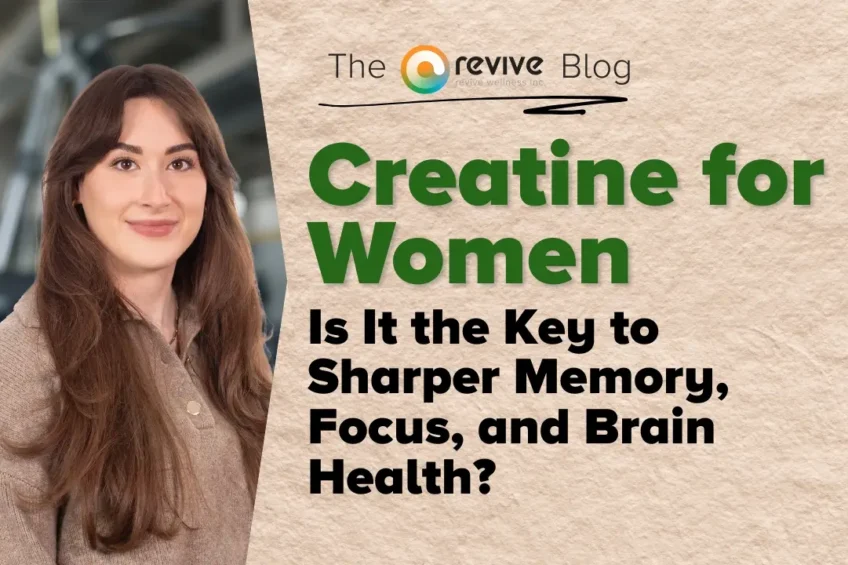Creatine for Women: Is It The Key to Sharper Memory, Focus, and Brain Health?
- Laura Velcoff
- October 2, 2025
From ‘Just for Guys’ to Game-Changer for Women: Let’s Talk Creatine
When you hear “creatine,” do you picture a bulky guy at the gym mixing powder into a shaker bottle? 💪 You’re not alone.
Many women think creatine will make them gain weight, that it’s only for athletes, or that a “made-for-women” version is necessary to achieve a “lean and toned” appearance, compared to the “big and bulky” look often associated with men. But, these ideas are either rooted in toxic diet culture marketing or are simply myths—and we’re here to clear them up. 🙅♀️
New research shows that taking a creatine supplement may help you think more clearly, feel less tired, and support your overall brain health (1). In this blog, we’ll show you how creatine works, why it matters for women, specifically, and the real truth behind the hype.🧠💕
What is Creatine?
Creatine is made in your body from three amino acids (arginine, glycine, and methionine). Most of it lives in your muscles, but some is in your brain too. 🧠 It helps give your body quick energy by restoring something called ATP (adenosine triphosphate). ATP is the main energy source your cells use to do things, like move your muscles and send messages in your brain. ATP is like a rechargeable battery—when you use energy, ATP gets used up, and creatine helps recharge it so your body can keep going🔋(1).
You also get creatine from eating animal-based protein foods, especially (2):
Red meat (like beef or pork) 🍖
Fish (like salmon and tuna) 🐟
Dairy (like milk and cheese) 🧀
Most people in North America get about 1 to 2 grams of creatine from food each day 🍽️. This fills up about 60 to 80% of the creatine their muscles can hold 💪(1). If you eat less animal protein (like if you’re vegetarian or vegan 🌱), you might not get much creatine from your diet. That’s one of many situations where a supplement can help!
Why Women Should Consider Creatine 🧬
Hormones & Creatine: A Unique Connection
Women naturally have lower creatine stores than men. This is partly because women usually have less muscle mass and different hormone levels (3).
Researchers think that creatine levels can go up and down based on (3):
Your menstrual cycle 🩸
Pregnancy or postpartum changes 🤱
Menopause 🔥
Because of this, creatine might be a helpful tool for women to support exercise performance, energy, focus, and even mood during these big body changes.
Mood Support & Protection
Did you know women are more likely to experience anxiety and depression? (4) Hormones are part of the story—but so is brain chemistry. Creatine may play a role in regulating mood and protecting the brain. While more research is needed, early findings are promising 🔬💚(3,5).
What the Research Says 📚
A 2024 review of 16 randomized controlled trials found creatine significantly improved memory, attention, and processing speed in adults—with especially strong benefits for women 💫(6). Other studies found it to be particularly helpful during high-stress periods, like (1):
Sleep deprivation 😴
Mental overload from multitasking 📋
This means creatine supplementation may be especially useful for women who are students, working professionals, or new moms navigating busy, sleep-deprived lives.
But Wait—if My Body Makes Creatine, Why Supplement?
Great question! Yes, your body does make some creatine on its own, and you get a bit from food. But—certain lifestyle factors can drain your ATP battery, increasing how much creatine your body uses up to recharge it🔋(7-8). Some things that might drain your ATP battery are:
everyday stress
lack of sleep
intense physical activity
poor diet
a busy schedule
During times of hormonal change—like your period, pregnancy, or menopause—your body’s creatine needs may rise even more, but the research is still early (3). If your body can’t keep up with these demands, you might notice it in small but important ways: feeling mentally foggy, struggling to concentrate, or running out of energy halfway through the day. 😴🌀
That’s where creatine supplements come in. By keeping your creatine levels fully topped up, you’re keeping your ATP battery charged, giving your brain and muscles the steady energy they need to power through work, workouts, and everything in between 💡💪.
How to Take Creatine (and is it Safe?) ✅
The best supplement form of creatine is creatine monohydrate. It’s the most researched, easiest to find, and safe for healthy adults (1).
💲 It’s affordable: a 1 kilogram tub—which currently costs about $50—can last 200 days using the recommended 5 grams per day dose
☑️ It’s safe for long-term use for most people
Always be sure to check with a health professional before starting a new supplement, especially if you’re pregnant, breastfeeding, or have a health condition.
Busted! Let’s Revisit Those Creatine Myths 🧪
Earlier, we mentioned a few common beliefs about creatine that might be holding women back. Let’s take a closer look:
🚫 Myth 1: Creatine makes you gain weight
❓Verdict? False!
➡️ Truth: Creatine might cause a small increase in water in your muscles at first—not fat gain. And women usually retain less water than men. Any bloating often goes away after a couple of weeks💧(3).
🚫 Myth 2: Creatine is just for athletes and bodybuilders
❓Verdict? False!
➡️ Truth: Creatine supports regular exercise performance, energy, and focus—not just heavy, competitive lifting. If you regularly workout, have a job, study, multitask, or parent—creatine might be your new best friend 🧠📚.
🚫 Myth 3: Women need a special “female” creatine
❓Verdict? False!
➡️ Truth: The “for her” packaging is just marketing. Regular creatine monohydrate is safe, effective, and backed by research—for women and men 👏(9).
🤔 Want to learn more about how to spot nutrition misinformation and marketing tactics—like creatine for women? Check our our blog—Smart Surfing: How to Spot Nutrition Misinformation Online!
We also made a podcast episode on creatine, too! Check that out here.
Still Not Sure? We Can Help! 💬
Not sure if creatine is right for you? Our Registered Dietitians can help you decide. We’ll walk you through what your body needs and how creatine could fit into your wellness plan.
📅 Book a free 15-minute discovery call today at revivewellness.ca
📞 Call us at 780-450-2027—we do phone and video appointments too!
References
Gutiérrez-Hellín, J., Del Coso, J., Franco-Andrés, A., Gamonales, J. M., Espada, M. C., González-García, J., López-Moreno, M., & Varillas-Delgado, D. (2024a, December 29). Creatine supplementation beyond athletics: Benefits of different types of creatine for women, Vegans, and clinical populations-A narrative review. MDPI. https://www.mdpi.com/2072-6643/17/1/95
Cleveland Clinic medical. (2025, March 19). Creatine. Cleveland Clinic. https://my.clevelandclinic.org/health/treatments/17674-creatine
Smith-Ryan, A. E., Cabre, H. E., Eckerson, J. M., & Candow, D. G. (2021). Creatine supplementation in women’s health: A lifelong friend. Frontiers in Nutrition, 8, 689943. https://pmc.ncbi.nlm.nih.gov/articles/PMC7998865/
Farhane-Medina, N. Z., Luque ,B., Tabernero, C., Castillo-Mayén, R. (2022). Factors associated with gender and sex differences in anxiety prevalence and comorbidity: A systematic review. Science Progress, 105(4). https://journals.sagepub.com/doi/10.1177/00368504221135469
Beam, C. R., Kaneshiro, C., Jang, J. Y., Reynolds, C. A., Pedersen, N. L., & Gatz, M. (2018). Differences between women and men in incidence rates of dementia and alzheimer’s disease. Journal of Alzheimer’s disease : JAD. https://pmc.ncbi.nlm.nih.gov/articles/PMC6226313/
Xu, C., Bi, S., Zhang, W., & Luo, L. (2024, July 12). The effects of creatine supplementation on cognitive function in adults: A systematic review and meta-analysis. Frontiers in nutrition. https://pmc.ncbi.nlm.nih.gov/articles/PMC11275561/#sec40
Allen, P.J. (2012, May). Creatine metabolism and psychiatric disorders: Does creatine supplementation have therapeutic value? Neuroscience & Biobehavioral Reviews, 36(5), 1442–1462. https://pmc.ncbi.nlm.nih.gov/articles/PMC3340488/
Gordji-Nejad, A., Matusch, A., Kleedörfer, S., et al. (2024). Single dose creatine improves cognitive performance and induces changes in cerebral high energy phosphates during sleep deprivation. Sci Rep 14, 4937. https://doi.org/10.1038/s41598-024-54249-9
Kreider, R. B., Kalman, D. S., Antonio, J., Ziegenfuss, T. N., Wildman, R., Collins, R., Candow, D. G., Kleiner, S. M., Almada, A. L., & Lopez, H. L. (2017). International Society of Sports Nutrition position stand: Creatine supplementation and exercise. Journal of the International Society of Sports Nutrition, 14, 18. https://doi.org/10.1186/s12970-017-0
About the Author

Laura Velcoff
I am all about helping people find joy in food again. Whether you are experiencing side effects of cancer, struggling with gut symptoms, or just wanting to relearn how to enjoy your meals, I’ve got your back. Together, we can make a positive impact by using strategies that are not only backed by evidence, but also guide you towards lasting behaviour change. Change can be so tough, but incredibly empowering when taking control of your own health. I am very excited to work alongside you in supporting your mind, body, and overall well-being!

